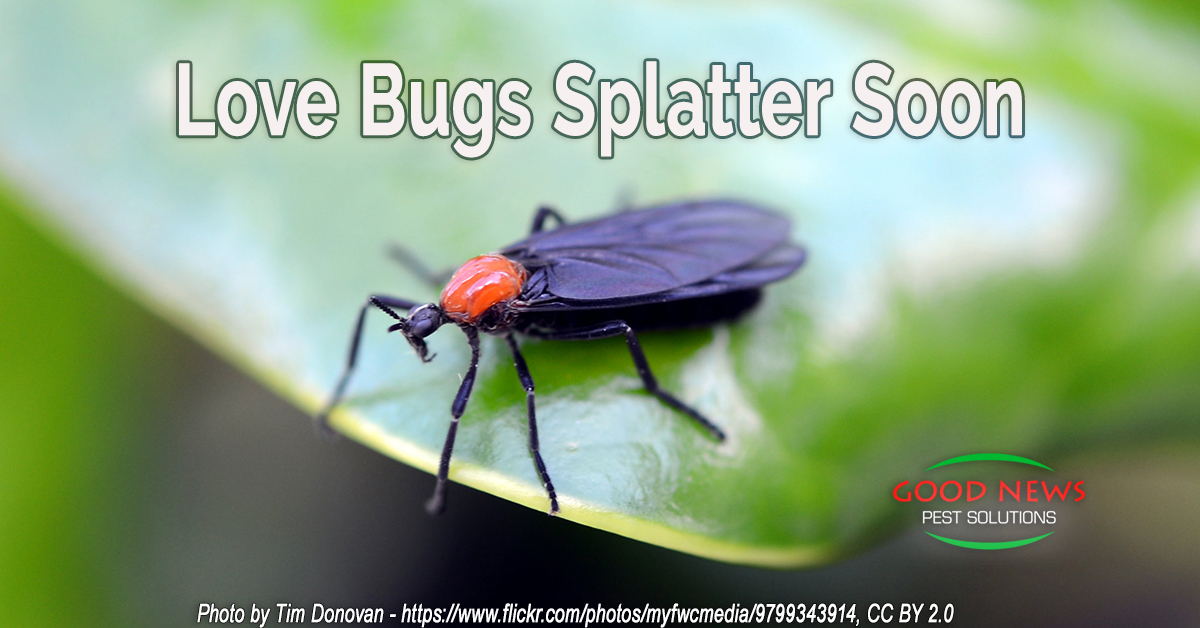
Love Bugs Splatter Soon
Sitting there on a leaf, a single Plecia nearctica looks pretty harmless. And they really are – most of the time.
Unfortunately, anyone who’s been on the Gulf Coast of Florida for more than 8 months has a different opinion. But then, most people don’t see lovebugs or march flies chilling on a leaf. Usually, they’re hosing dozens off the front end of their cars.
Thankfully, things have improved over the last 20 years or so – innovations in car paint and some other factors mean that accidently driving through a lovebug swarm doesn’t mean a ruined paint job. Although you probably do need to hit the car wash again.
Twice a Year
Lovebug season is unusual as it happens multiple times. For 6-8 weeks between April and May, and again in August to September, we see the designated lovebug mating season.
That’s actually where their common name came from. Lovebugs are only around and an issue when they’re in mating season. The exhaust fumes from our cars acts as a weird sort of combination pheromone and aphrodisiac. The odors draw both sexes into the streets and highways to get together and live (a very short life) of ‘wedded’ bliss.
If they survive the freeway, the two bugs remain attached, and after a few days the male dies. The female continues to carry him around until she can lay her eggs and then releases him. They usually die themselves within a day or two.
Snowbirds or Tourists?
Lovebugs are especially prevalent on the Gulf Coast of Florida because of our warm, humid climate. They’re pretty much active year-round, but we only notice them when they swarm to mate.
And while they’re less of a problem these days, they can still screw up your engine by clogging your radiator, severely cutting into your visibility (splatting all over the windshield), and if you don’t hose them off or hit the local car wash within a couple of days, they do start to degrade your car’s paint.
They can also become a problem for your flower beds. Especially if the soil is moist, the female will lay her eggs there and the developing larvae can chomp a fair amount of your leafy greens.
But they’re not all bad. Lovebugs provide a healthy food source for birds, lizards, armadillos, and spiders, as well as earwigs and centipedes.
Dealing With All That Love
Similar to our favorite flying insect, the mosquito, lovebugs are easier to prevent than prevail against. Make sure you’re clearing out any standing water around your house or yard. That includes pet dishes left out and bird baths in the backyard. Keeping your yard clear of clutter also helps avoid any missed areas for laying eggs.
Essential oils, especially peppermint, can sometimes ward off both lovebugs and mosquitoes. If lovebugs end up in your home, it’s easy to vacuum them up.
If you don’t go to the car wash – or can’t afford to every couple of days – make sure you’re wiping down your windshield, grill, and bumpers with mild soapy water to get rid of the splattered mess.
And while this next period of mating is the largest for lovebugs, just know it only lasts so long, and being aware is half the battle.
As for the other creepy crawlies we see in the Sunshine State, it’s always good to consult a professional. Our most popular solution – Go Green Perimeter Plus – takes care of spiders, roaches, ants, silverfish and more. And it does so while keeping your family and the planet safe.
For more details on it or any of our other effective green treatments, just give us a call!
Proudly Serving
Sun City Center, Ruskin, Palmetto, Parrish, Ellenton, Bradenton, Anna Maria, Holmes Beach, Bradenton Beach, Longboat Key, Lakewood Ranch, University Park, Myakka City, Sarasota, Siesta Key, Osprey, Nokomis, Casey Key, Venice, Englewood, North Port, Port Charlotte, Punta Gorda, Arcadia
Things You Can Do
Pay Your Bill Online
Leave Us a Review
Request a Free* Termite Inspection
Stop Mosquito Bites
Get Rid of Rodents
Get a Termite Damage Warranty
Get Pest Control for Your Attic
Get Pest Control for Your Business Request Prayer
Corporate Address
1080 Enterprise Court, Ste A
North Venice, FL 34275
Call Now: (941) 412-9610
Text: (941) 412-9610
Fax: (941) 412-0080
